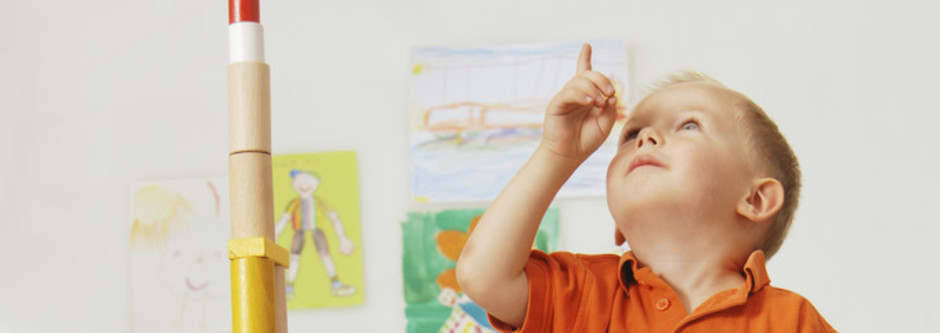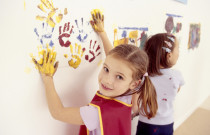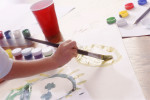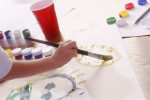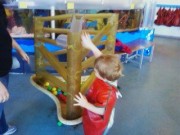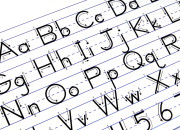Philosophy and Curriculum
ALL CLASSROOMS IN OUR CENTERS HAVE A CURRICULUM ON HAND, WHICH YOU ARE WELCOME TO LOOK OVER.
ELC of RI uses Creative Curriculum which is was created from Rhode Island's RIELDS standards. This can be viewed in depth at www.RIELDS.com . These standards promote and encourage physical and motor health development, social and emotional development, language development, literacy, cognitive development, mathematics, science, social studies, and creative arts.
Our creative curriculum is a established and recognized standard in the education school system. Many persons are also aware of the recently created curriculum of "core Standards" for elementary schools which our creative curriculum helps children transition into allowing the children to be on track when they enter public schooling.
Our curriculum however is not solely focused on one way of teaching. We do incorporate teaching styles, approaches, methods, and materials from other philosophies such as Montessori and Reggio Amelia. We have created our own style of combined teaching incorporating many philosophies in order focus on what our families feel are the most useful parts, while limiting opinions or biases that creators or followers sometimes have when dedicating their self to one idea or philosophy. We feel that teaching tools created by Montessori, such as zipper boards and sensory learning, can significantly help a child to learn using multiple senses and experiences. We also accept the ideas that art and music are essential in our society and that the Reggio Amelia approach that children can take part in the teaching of a group, and the belief that daily use of creativity is vital in early learning.
Our Age Groups:
Infant Program (Ages 6 weeks to 18 months)
Our infant program starts with a nurturing environment with attention to the individual needs of each child. Daily information sheets provide essential communication between staff and parents
regarding daily care. Our Infants love the interaction of sight and sounds and we purposely build our infant rooms to facilitate these experiences. We provide a soothing
peaceful environment to assist when the growing infants are sleeping, but display vivid and warm colors on the walls to encourage curiosity and intrigue when tiny eyes stare out at their new
world. Our certified infant teachers are instrumental in building trust with the infants by creating a secure environment in which early cognitive thought and language skills can
be developed. Infants in our state approved (infant safe) classrooms learn quickly using their new found senses of touch, sight, smell, and hearing. This learning is highly
encouraged at ELC and occurs through the use of unique textures, colored sights, yummy smells, and even through the songs of music.
Younger Toddlers Program (Ages 18 months to 2 years)
The focus of this program is building language skills and fostering the children’s ever-increasing curiosity. Our playful environment encourages milestones, explorations, hugs and giggles.
Older Toddler Program (Ages 2 to 3 years)
Toddlers test their independence and learn some self-help skills while learning to enjoy stories, music, painting and more. Parents also receive daily information sheets.
Preschool Program (Ages 3 to 4 years)
Each child’s pre-academic experience should begin in an environment which fosters a firm belief in his or her own capacity to learn. This can only be done when the development of the whole child is
considered. Our preschool curriculum recognizes that the relationship between language acquisition and later academic achievement Is well documented. Opportunities to build language development,
encourage exploration and expand on personal interests abound.
Pre-Kindergarten Program (Ages 4 to 5 years)
In preparation for kindergarten, our program combines the expectations of the Early Learning Standards with the development of
additional skill building in the areas of math, science, language arts, art and music. We believe that building confidence and an enthusiasm for learning is the best start to a successful
education. Our pre-schoolers’ experience a variety of age appropriate activities in the following different areas: reading, math, science, gross motor, fine motor, cooking and
free-play. Each learning area offers interest centers from which the children can choose activities. Parent communication is achieved through newsletters that provide the classroom’s
topics for the week and a series of parenting tip articles.
Kindergarten Program (Ages 5 to 6 years)
The kindergarten curriculum is consistent with the expectations of both the Rhode Island Department of Education and the National Association for the Education of Young Children. Licensed and
approved by the Department of Education, kindergarten children follow a curriculum implemented by the Head Teacher to prepare them for first grade. This program provides a balance of
child-directed and teacher-directed activities with an emphasis put on academics such as: reading, writing, math, science, social studies, time and following directions. The curriculum also
incorporates language arts, art, and music of varying specialties.
The kindergarten curriculum emphasizes language development as the cornerstone of academic achievement. Children are active participants in their learning, with a focus on meaningful experiences rather than isolated skill development. They are taught to develop basic skills through creative play and social interaction.
We design “centers” in each classroom to allow children a choice of activities. Center areas include: art, sensory, reading, writing, math, block building, dramatic play and computers. These centers provide opportunities for children to learn individually or in small groups. The use of themes and centers allow the child to determine how far he or she wishes to take such an experience. All children are provided guidance, but at ELC a children’s imagination is greatly encouraged.
School Age Program (Ages 6 to 12 years)
Before & after school and school vacation programs are provided for children to ease the transition from school to home for working families. While there are learning tablets available, the teachers always ensure that homework is completed first.
